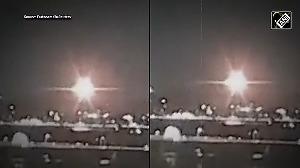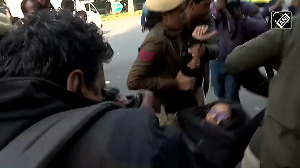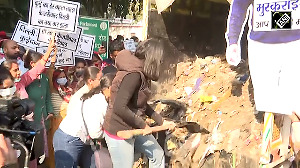US Ambassador to Pakistan William B Milam held a secret meeting with an unidentified senior Taliban official in September 2000 and assured him that international sanctions on the Taliban would end if bin Laden were expelled from Afghanistan, newly declassified documents show.
"The ambassador added that the US was not against the Taliban, per se," and "was not out to destroy the Taliban," Milam wrote in a secret cable to Washington, recounting his meeting.
A declassified version of the cable was released Thursday, obtained by George Washington University's National Security Archive under the Freedom of Information Act.
Milam told the Taliban official -- whose name is excised from the declassified document -- that bin Laden was the main impediment to better relations between the Taliban and the United States.
"If the US and the Taliban could get past bin Laden, we would have a different kind of relationship," Milam said he told the official.
At the time, a year before the September 11 attacks, Washington had no formal diplomatic relations with Afghanistan because of human rights and other abuses by the militant Islamic Taliban regime.
State Department spokesman Sean McCormack said the Bush administration had no comment on the meeting, which occurred before President Bush took office.
In his 2000 diplomatic cable, Milam told his bosses the Taliban official had adopted a "far less obstreperous" tone than usually heard from the Taliban, and suggested the United States do some small favor for Afghanistan to show good will.
The meeting in Islamabad, Pakistan, produced no promise from the Taliban to turn over bin Laden, and it is not clear from the material released Thursday what the Clinton administration did next.
By June 2001 under the Bush administration, Milam was warning Afghanistan that the Taliban leadership would bear responsibility for any attack on American targets by bin Laden, the US Embassy in Pakistan reported at the time. Milam's cable was among Afghanistan-related documents acquired by the National Security Archive, which posted them on its Web site.
Other documents released Thursday chart several years of unsuccessful US attempts to drive bin Laden out of Afghanistan.
At the time of Milam's cable, the United States knew bin Laden was living under Taliban protection along the Afghan-Pakistani border and running his al-Qaeda terror network from Afghanistan. US diplomats had periodic contact with the Taliban to urge his ouster.
The United States had accused bin Laden of orchestrating two 1998 US embassy bombings that killed Americans in East Africa, but neither he nor his terror network were the household names they became after the jetliner attacks on New York City and Washington in September 2001.
Shortly after the attacks, US forces helped the Afghan opposition Northern Alliance overthrow the Taliban government and hunt down its leaders. The Bush administration's goal was twofold: rout bin Laden's protectors and capture bin Laden himself.
Nearly four years after the invasion, a 21,000-member US-led coalition force remains to fight Taliban remnants and keep order despite the emergence of a new US-allied government. Neither bin Laden nor Taliban leader Mullah Mohammed Omar have been captured.
A reinvigorated insurgency killed two US soldiers Thursday when a roadside bomb hit a military convoy protecting road workers, and the new American ambassador warned that violence by Afghan rebels would not end soon.
A surge of violence since winter has killed about 1,000 people -- including 59 American soldiers. Militants have stepped up assaults in the south and east trying to sabotage the country's US-backed recovery.
On the Net: National Security Archive






 © 2025
© 2025